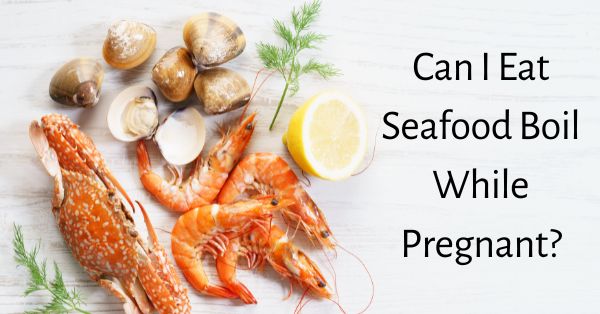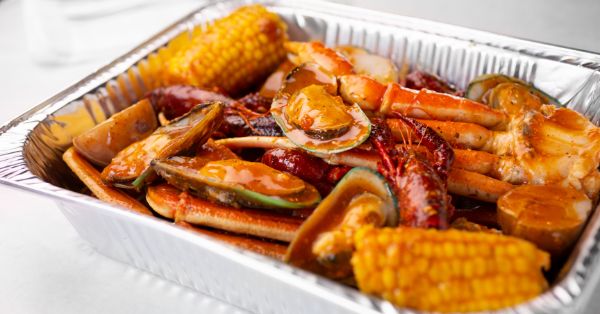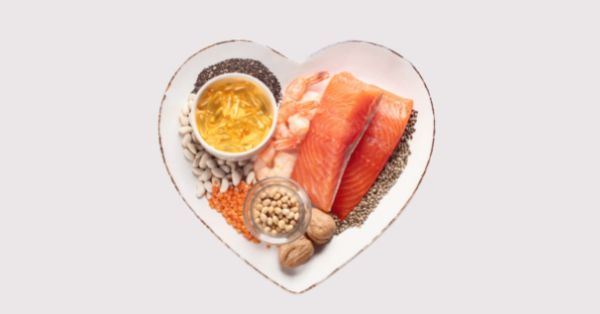If you’re a food lover like me, you’ll admit how addictive seafood dishes are. Fresh or seawater gives the crawfish, salmon, crabs, and oysters a unique taste. But you’re pregnant. Now what?
When figuring out what to eat or not while pregnant, your health and that of your unborn baby should come first. Always talk to a professional nutritionist for guidance.
I know you’re a seafood and not sure if “you have to stop eating it for now. You’re looking at your favourite restaurant’s menu and are wondering, “Can I eat seafood boil while pregnant?”
In the article, let’s talk about seafood boils, its numerous benefits, and how to eat it safely when pregnant.

Can I Eat Seafood Boil While Pregnant?
Yes, it is perfectly fine & healthy for a pregnant woman to eat controlled portions of seafood boil per serving. Seafood boil contains different fishes such as catfish, shrimps, lobsters, and crawfish that provide nutrition, beneficial to you and your baby.
The additional vegetables and mild seasoning give you a well-balanced diet for a healthy pregnancy. However, eat it sparingly and consider fish with lower amounts of mercury to avoid harming your baby’s brain.
What is a Seafood Boil?
It is a delicacy used by friends and families to enhance togetherness during gatherings and events. Originally from the gulf coastal regions, Seafood boils are made by mixing a variety of fishes, including crabs, lobsters, crawfish, catfish, and shrimps, among others.
The above seafood is added to vegetables, such as potatoes and corn, before boiling all the ingredients in a mildly seasoned broth. Once ready, it’s popularly served with fresh lemon or parsley.
The boiling method of cooking is healthier because there are no added oils. Aside from the delicious taste, seafood boils are health-rich and great for pregnant women.
Can Pregnant Women Eat Seafood Boil?
Yes. It’s perfectly healthy for pregnant women to eat seafood boil. If you’re looking for a natural source of Omega-3 fatty acids, the seafood included is rich in natural fatty acids.
While eating seafood and fish forms a healthy eating pattern, the U.S Food And Drugs administration recommends the consumption of seafood varieties from low-mercury sources to be 8-10 ounces (340 grams) for pregnant and breastfeeding women.

Benefits of Eating Seafood Boil for Pregnant Women and Their Babies
If you’d love to have a healthy baby, it all starts with what you eat during pregnancy. Consult your nutritionist about portions and food types to include in your menu.
Eating a seafood boil has a myriad of benefits, such as:
- The seafood boil is an excellent source of omega-3 fatty acids, thanks to the ingredients in fish varieties. The fats help your baby’s growing mind to develop fully.
- Seafood boils are rich in proteins too. If you include shellfish, it provides zinc and iron, crucial for your baby’s growth.
- Seafood curbs depressive disorders in pregnancy. The daily hormonal shift, fatigue, pregnancy complications, plus home and work possibilities could overwhelm you, leading to depression. According to the Seafood Nutrition Partnership, fish and seafood lovers are 20%less likely to suffer depression than their counterparts. Eating seafood boils may improve your mental health.
- A seafood boil containing shrimps and lobsters makes your baby’s heart and brain fit. Research shows such babies to have a high I.Q and are less likely to suffer cardiovascular disorders or diabetes in the future.
Best Fishes to Include in a Seafood Boil for Pregnant Women
Not all types of seafood are safe to include in your seafood boil. Some predatory fish, including sharks, swordfish, orange roughy, tilefish, and lings, have high levels of methylmercury that could seriously harm your baby’s brain and nerves.
That said, the best lower-mercury fish are:
- Salmon
- Herring
- Trout (freshwater)
- Mackerel (from the Pacific)
- Sardines
Mercury has severe long-term effects since it gradually accumulates in your bloodstream.
How to Take Seafood Safely During Pregnancy
While the concern, can you eat seafood boil while pregnant often arises, let’s explore how to enjoy this cuisine safely by doing the following:
1. Ensure the fish, prawns, and shellfish in your seafood boil are fully cooked. If your seafood, especially lobsters and sushi, is semi-raw, you risk getting harmful bacteria and viruses.
2. Eat lower mercury fish instead of large predatory ones to minimize mercury contamination that could harm your munchkin.
3. Check the local fish/seafood advisories to know the safe fish from local waters to include in your seafood boil.
4. Eat smaller quantities of seafood boil. With the highly-concentrated Omega -3 fatty acids and natural proteins, overeating seafood boils could make your baby obese. Excessive baby weight could lead to a complication during delivery.

Other Sources of Omega- 3 Fatty Acids for Pregnant Women
Aside from seafood, you can also source beneficial fatty acids from:
- Supplements- special prenatal supplements and vitamins have DHA (Docosahexaenoic acid). Others contain fish oil. Ask your doctor about the most suitable prenatal supplements for you.
- Commercially fortified foods- yogurt, whole milk, and eggs are often fortified with Omega-3.
- Nuts and seeds- flax seeds, ground nuts, canola oil, sunflower, and pumpkin seeds are among the best sources of Omega-3 during pregnancy.
Wrapping Up
With lots of information available about safe eating in pregnancy, it’s not easy to choose what works best. Many pregnant women wonder, “can I eat seafood boil while pregnant?” The good news is, yes, you can. But remember to keep it moderate and safe.
There’s scanty research showing the dangers of enjoying your favourite seafood as part of a seafood boil. On the other hand, different lower-mercury fishes provide nutrition and Omega-3 fatty acids crucial for your baby’s growing heart and brain.
However, mind your portions and avoid eating seafood boils containing sharks, swordfish, and other high-mercury fishes. The common methylmercury affects your baby’s health later in life. While you’re free to enjoy this delicacy, follow the advice of your doctor/nutritionist to keep you and the baby healthy.
More to Read: